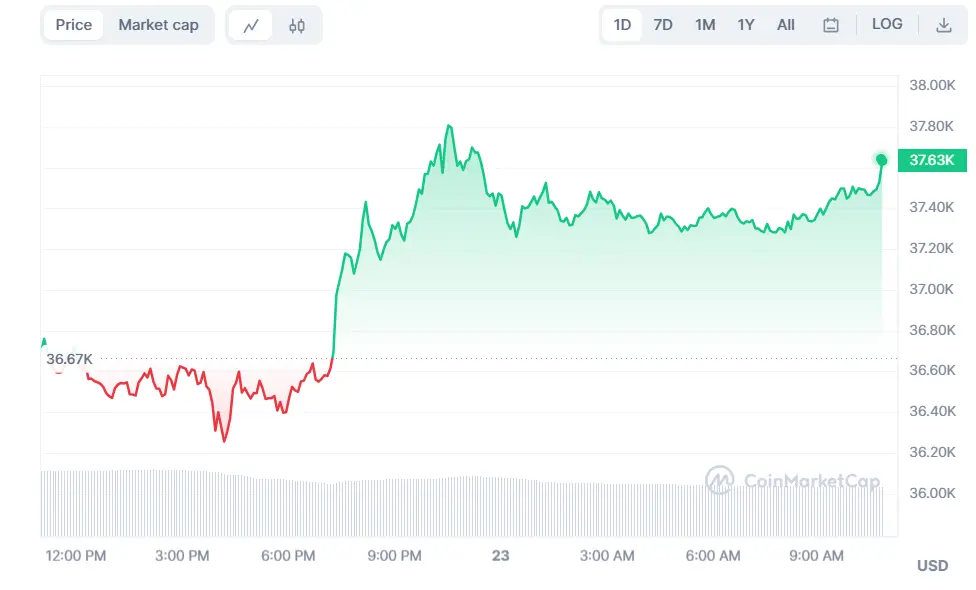If you’re unfamiliar with the term, a ‘cryptocurrency’ is a type of digital or virtual currency. It operates independently of a central bank and is secured by cryptography, making it almost impossible to counterfeit.
Simply put, it involves putting your money into these digital currencies with the hope that their value will increase over time. But it has its own numerous advantages and potential downsides.
What Does Cryptocurrency Investment Entail?
Cryptocurrency investment is all about buying digital currencies such as Bitcoin (BTC), Ethereum (ETH), Litecoin (LTC), Shiba Inu, and other digital assets with the hope of making profits off them when their value goes up over time.

Similar to the way you might want to buy a share of a company on the stock market, you can buy a ‘piece’ of a cryptocurrency.
So when you invest in cryptocurrency, you’re buying digital tokens or ‘coins’ of a cryptocurrency. You’re hoping that the demand for these coins will go up, driving up their price. If that happens, you can sell your coins for a profit. But you must also take precautions to reduce losses whatever the case may be.
For instance, the opening price for Bitcoin in September 2023 was $25,934.02, it was up 44.06% by November 23, 2023, trading at $37,357.50.
So, you can imagine the return you would have made if you bought BTC in September 2023 and sold it on November 23, 2023, but you shouldn’t be overwhelmed by the gains.
Just like investing in stocks or real estate, it carries its own unique set of risks and rewards. Investing in crypto is extremely volatile than stocks or real estate
Pros of Cryptocurrency Investment
High Returns:
One major factor contributing to this popularity is the potential for high returns. Some people who bought cryptocurrencies like Bitcoin in the early days have made substantial profits.
One of such people who has made enticing profits from crypto investment is the anonymous BTC philanthropist behind Pineapple Fund, which gave over 5,000 Bitcoins to charities to medical research, human rights, and environmental conservation around the world.
Stories such as Pineapple Bitcoin Fund, and “crypto millionaires” have fueled interest in this digital asset class.
Accessibility
Another reason is the convenience and accessibility cryptocurrencies offer. With an internet connection and a digital wallet, anyone can buy, sell, or hold cryptocurrencies, anytime, anywhere, and make transfers through your wallet.
Traditional barriers to entry in investment like paperwork and brokerage accounts are non-existent whenever, and wherever you choose to invest in crypto assets.
Future Of Finance
Cryptocurrencies are also seen as the future of finance by many. They have the potential to revolutionize the way we transact, making money transfers faster, cheaper, and more efficient.
But while there’s a lot of excitement, it’s crucial to remember that investing in cryptocurrency also involves significant risks such as market volatility, regulatory uncertainties, and security issues.
Liquidity and 24/7 Market
The cryptocurrency market operates 24/7, meaning you can buy and sell cryptocurrencies at any time of the day, unlike traditional stock markets that observe public holidays. This high liquidity of crypto offers flexibility for investors.
Ownership and Control
When you invest in cryptocurrencies, you have full control over your investments. Thanks to digital wallets and private keys, you’re in charge of your own crypto assets without the need for a traditional bank.
Diversification Potential
Investing in cryptocurrencies can also offer diversification for your investment portfolio. With thousands of cryptocurrencies available, you can spread out your investments across different digital assets.
Transparency and Security
Transactions made with cryptocurrencies are recorded on a technology called blockchain, a kind of digital ledger. This ensures transparency and security, as the transactions cannot be altered or tampered with
Challenges of Investing in Cryptocurrency
Volatility and Unpredictability
Cryptocurrency prices can fluctuate wildly in very short periods. This volatility can lead to significant gains, but it also means potential for substantial losses as it can be seen in the screenshot below:

Risk of Loss Due to Hacking
While blockchain technology itself is very secure, cryptocurrency exchanges or your digital wallet can still be vulnerable to hacking.
From 2014 to the time of publication, there have been 17 crypto exchanges that shut down because they were hacked. When this happens, investors lose their investments.
Regulatory Uncertainty and Legal Risks
The legal status of cryptocurrencies varies widely from country to country and is still undefined or changing in many places.
This regulatory uncertainty can pose a risk to investors. In the early days of crypto, China used to be the headquarters of Bitcoin mining, but the country came up with hash regulations which forced many crypto mining farms out of China.
Environmental Concerns
Cryptocurrencies like Bitcoin require massive amounts of energy for mining and transaction processing, leading to substantial carbon emissions.
This environmental impact is a concern for many investors. But there is good news: Some firms are resorting to environment-friendly means of power generation for mining.
Difficulties in Valuation
Unlike stocks and bonds, cryptocurrencies don’t produce cash flows like interest or rental income, making them difficult to value. This makes it hard to predict their future price movements.
For instance, Ethereum was $2,077.39 at the time of updating this article, but at the time of hitting the publish button, the price had dropped to $2,070.89/ETH.

